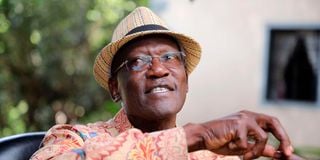Premium
President Ruto goes silent on state capture, 2022 poll probes

Johnson Muthama, then the United Democratic Alliance chairman, during an interview at his office in Gigiri, Nairobi, March 24, 2022.
Allies of President William Ruto seem to have backtracked on their push for investigations into the 2022 elections and state capture amid rising concerns that it could be counterproductive.
The move is seen as likely to unsettle the government after the National Security Advisory Committee (NSAC) had been sucked into the events leading to the August 15, 2022 declaration of the presidential results.
The President has equally gone slow on the establishment of a judicial commission to probe alleged “state capture” by former President Uhuru Kenyatta’s government, which he promised to set up within 30 days after being sworn into office.
The President, alongside opposition leader Raila Odinga, had backed plans for the formation of an inquiry into the conduct of last year’s elections as suggested by the Independent Electoral and Boundaries Commission (IEBC), but there are reports that the Head of State had developed cold feet as the move could be a double-edged sword.
The outcome of the inquest, which has also been requested former IEBC chairman Wafula Chebukati, could also be counterproductive to the commission, if the fresh revelations by a whistle-blower on the August 9, 2022 results indicating Mr Odinga won the polls are anything to go by.
United Democratic Alliance (UDA) chairman Johnson Muthama last week told Nation the probe wasn’t a priority.
“Forming a commission of inquiry now is not urgent but it is the discretion of the President because he is the one being asked to form it,” Mr Muthama said.
Won elections
Mr Odinga had also backed the plans for the inquest into the 2022 poll, even calling for an independent audit of IEBC servers to ascertain claims by a whistle-blower that he won the elections with 8,170,353 votes (57.3 per cent) against Dr Ruto’s 5,915,973 (41.66 per cent).
President Ruto had last month indicated that he would set up a judicial commission to probe state capture in the previous regime, but would deal with other pressing issues first.
“Our plate is full, we have to balance between sorting out the economy or [waste our energy on this]. However, I assure you that story will be told,” Dr Ruto said during a joint media interview.
But Nation understands that, during the President’s recent meeting with Jubilee legislators at State House in Nairobi, the MPs urged him to stop hounding Mr Kenyatta, which could signal an end to the inquiry plans.
Legislators in Dr Ruto’s Kenya Kwanza Alliance have been rooting for the formation of an inquest to probe go-ing-on at the Bomas of Kenya last year just hours before Mr Chebukati declared Dr Ruto the President-elect, but others seem to have started developing cold feet after Mr Odinga backed such calls.
National Assembly Majority Whip Sylvanus Osoro said a commission of inquiry would not improve the lives of Kenyans.
Nyaribari Chache MP Zaheer Jhanda said the Kenya Kwanza administration would form the commission of inquiry immediately it has turned around the country’s ailing economy.
Kesses MP Julius Ruto said the President intends to run a united country and is not interested in exacting revenge on anyone.
Orange Democratic Movement (ODM) National Treasurer Timothy Bosire insisted on the need for a commission to unearth the truth about what transpired in the elections.
“They should not back down on this plan. What is their fear now? If the current leadership is sure of their victory, it should accept this move and let the whole world know that we are sore losers,” Mr Bosire said.
Multimedia University lecturer Prof Gitile Naituli, his United States International University counterpart Prof Macharia Munene and associate research professor of development studies Winnie Mitullah said a public inquest into the outcome of the last elections could help debunk the propaganda coming from both sides of the political divide.
“We need to know the truth. We need an inquiry to clear the way and to tell us what the truth is,” said Prof Naituli.
“Serious allegations have been made and they should not be taken lightly. The country should not operate out of fear that investigations will create national unease because it is failure to do so that will prolong uncertainty and damage the political environment,” Prof Munene said.
Commission of inquiry
He said a commission of inquiry akin to the Kriegler commission should be put in place.
“I have previously called for a thorough Kriegler type of investigation, involving men and women of repute from both sides in the commission, to unearth what happened. Fear of the likely consequences is a real threat to national interest. The investigation might help to make it difficult for such things to happen again,” Prof Munene added.
Prof Mitullah noted that the probe will be a double-edged sword for both camps, but “for the public it will be good to stop the intrigues from both parties.”
The Kriegler Commission, officially the Independent Review Commission, was an international commission of inquiry established by the government in February 2008 to look into all aspects of the 2007 General Election, particularly the presidential poll.
It was chaired by a former South African Judge Justice Johann Kriegler.





